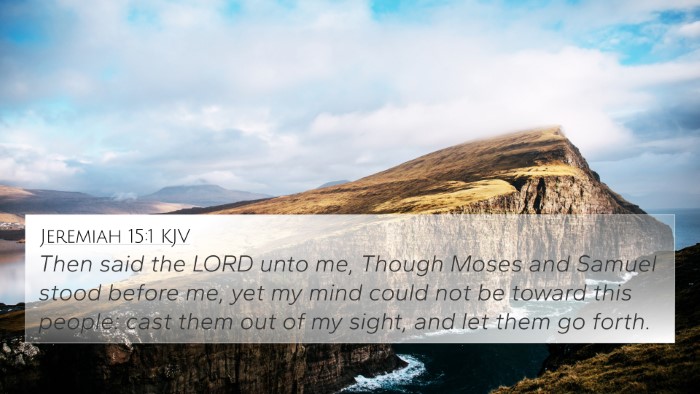Lamentations 3:44 - Summary and Interpretation
Bible Verse: "Thou hast covered thyself with a cloud, that our prayer should not pass through."
This verse from Lamentations is a poignant expression of the desolation experienced by the people of Israel during their time of suffering and exile. In this context, God's seeming silence and distance are felt strongly amidst the trials.
Contextual Overview
The Book of Lamentations reflects deep sorrow and mourning, particularly in relation to the destruction of Jerusalem and the suffering of its people. This sorrow is not merely personal, but collective, reflecting the nation’s relationship with God.
Commentary Insights
-
Matthew Henry: He emphasizes the protective nature of God, who covers with a cloud to shield His people, but here it is as though this cloud has become a barrier, preventing prayers from reaching Him. The spiritual desolation reflects a state of being cut off from God.
-
Albert Barnes: Barnes discusses how a cloud often symbolizes God's presence but also His hiddenness and absence. The verse suggests that the prayers of the afflicted seem to be hindered from reaching God due to His apparent withdrawal.
-
Adam Clarke: Clarke interprets this cloud as a metaphor of God's judgments. He argues that while God was actively involved in the fate of His people, their sins led to a disconnection, thereby illustrating the nature of divine justice.
Thematic Bible Verse Connections
The theme of feeling distant from God in moments of anguish resonates throughout Scripture. Below are connections and cross-referencing biblical texts that underscore this theme:
- Psalm 22:1: "My God, my God, why hast thou forsaken me?" - This verse echoes the feelings of abandonment felt in Lamentations 3:44.
- Isaiah 59:2: "But your iniquities have separated you from your God." - Explains how sin can create a barrier between God and His people.
- Psalm 66:18: "If I regard iniquity in my heart, the Lord will not hear me." - Similar to Lamentations, sin affects our prayers reaching God.
- Micah 3:4: "Then shall they cry unto the Lord, but he will not hear them: he will even hide his face from them." - Reflects God’s response to unrepentance.
- 1 Peter 3:12: "For the eyes of the Lord are over the righteous, and his ears are open unto their prayers: but the face of the Lord is against them that do evil." - The contrast between the righteous and the wicked in prayer availability.
- Jeremiah 14:10: "Thus saith the Lord unto this people, Thus have they loved to wander, they have not refrained their feet..." - Highlights rebellion leading to withdrawal of divine help.
- Isaiah 1:15: "And when ye spread forth your hands, I will hide mine eyes from you: yea, when ye make many prayers, I will not hear: your hands are full of blood." - God's refusal to listen due to the sinful condition of His people.
Interpretational Reflections
Understanding Lamentations 3:44 involves recognizing the profound sense of loss and the plea for divine attention amidst silence. Such feelings are found across numerous Scriptures, highlighting the relationship dynamics between God and His followers.
This emotional and spiritual distance invites deeper exploration into the reasons behind divine silence and the conditions required for restored communion with God.
Using Cross-References Effectively
To delve deeper into the understanding of Biblical texts like Lamentations 3:44, utilizing tools for Bible cross-referencing is essential. Here are some suggested methods:
- Utilize a Bible concordance to find words and themes related to Lamentations 3:44.
- Engage in cross-reference Bible study to explore connected themes and messages.
- Employ a Bible cross-reference guide which can offer pathways to explore thematic connections.
- Practice cross-referencing Bible study methods that establish links between different authors and books.
- Utilize Bible chain references to trace the development of themes surrounding prayer, sin, and God's response.
Conclusion
Lamentations 3:44 serves as a poignant reminder of how sin can obstruct communication with God, a theme widely illustrated throughout the Scriptures. By engaging in comparative Bible verse analysis and making use of comprehensive Bible cross-reference materials, one's understanding of God's Word can be enriched, allowing for a deeper spiritual journey.








